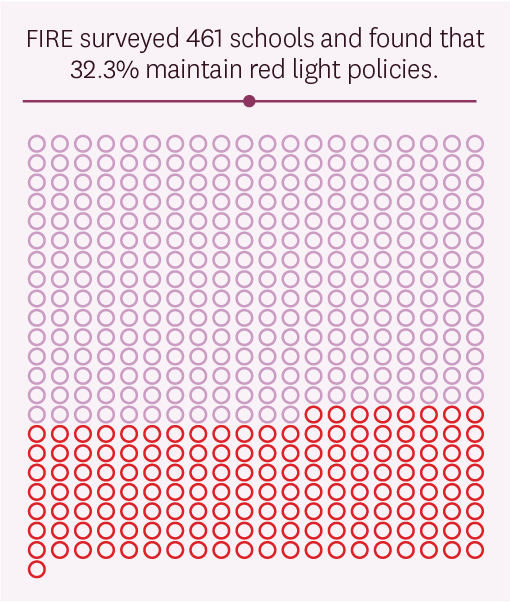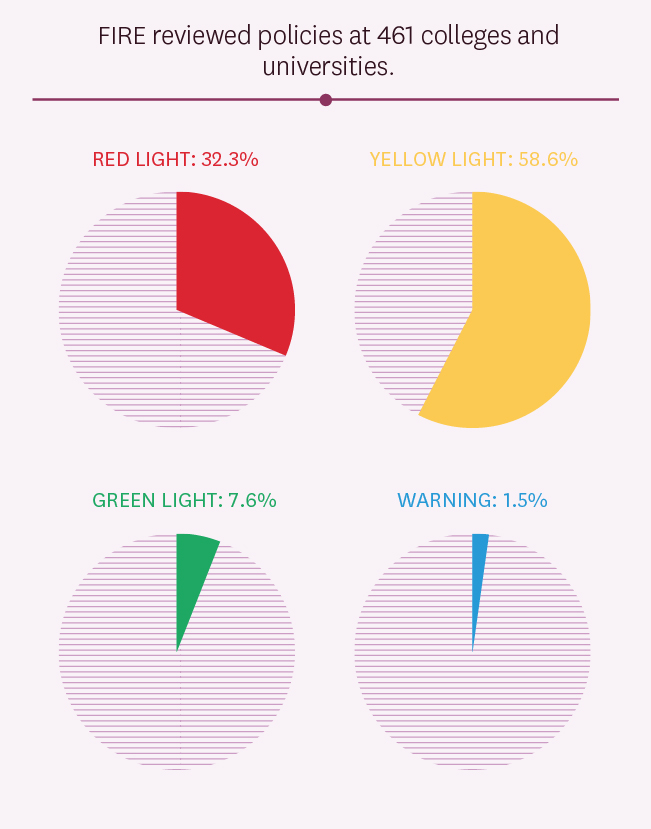RALEIGH — North Carolina is a national front-runner in protecting campus speech rights, a recent report from the Foundation for Individual Rights in Education shows.
FIRE, a nonprofit research and legal organization, examines more than 450 public and private universities each year. Schools are rated based on the constitutionality of their speech policies.
Red-light schools have restrictive policies — such as free speech zones or bans on “offensive speech.” Yellow-light schools hold vaguely worded policies — such as rules against “verbal abuse” that may be used to restrict free expression. Green-light schools have written policies posing no threat to the First Amendment.

Just 35 out of 461 surveyed schools received green lights this year. North Carolina is home to eight green-light schools, far and away the national leader, Samantha Harris, a FIRE spokeswoman, told Carolina Journal. Pennsylvania is next with four, followed by Indiana and Virginia, with three each.
The latest ratings are encouraging, Lt. Gov. Dan Forest, who has worked with FIRE to bolster free speech across the University of North Carolina’s 16 schools, told Carolina Journal.
North Carolina surged up the ranks last year when several UNC schools overhauled policies choking speech. In 2016, only UNC-Chapel Hill was ranked green. In May 2017, UNC Greensboro and N.C. Central, formerly ranked as red-light schools, saw their lights turn green.
Appalachian State University, UNC-Charlotte, East Carolina University, and UNC-Wilmington were green-lighted later that year.
Duke University is North Carolina’s only private school with a green light.
In 2008, only eight schools in the nation were rated green. But while speech rights are gaining traction on campuses, roadblocks remain, FIRE says.
“Since public colleges and universities are legally bound to protect their students’ First Amendment rights, any speech codes — red or yellow light — are unacceptable,” the report states.
This year, 93 of 357 public universities were ranked red, and 233 were yellow. Only 31 got a green light.
Of 104 private colleges, 56 were red, 37 were yellow, and four were green. The remaining seven schools were labeled as “warning schools,” which don’t promise free speech. Those universities prioritize other values — many religious — over the First Amendment.

“Despite the critical importance of free speech on campus, too many universities — in policy and in practice — chill, censor, and punish students’ and faculty members’ expressive activity,” the report says.
“It is imperative, therefore, that those who care about free speech on campus continue to stay vigilant. The decrease in speech codes and the proliferation of free speech policy statements are the result of the relentless work of free speech advocates.”
A handful of North Carolina lawmakers are outspoken supporters of free speech. The legislature in 2017 passed a bill to fortify First Amendment rights on UNC campuses.
House Bill 527, Restore/Preserve Campus Free Speech, required the UNC Board of Governors to adopt a uniform speech policy for the UNC system. It also directed the board to form a Committee on Free Expression.
The board adopted such a policy late last year.
Some organizations, including the American Civil Liberties Union of North Carolina, cautioned against the law, stating it could chill speech — not protect it.
The bill was a solution in search of a problem, ACLU spokeswoman Susanna Birdsong told CJ during a May 2017 interview.
“We do believe that the UNC system and North Carolina colleges in general are effectively protecting speech on their campuses today, and that there are existing remedies that are working well when they don’t do that,” Birdsong said.
When H.B. 527 passed, only one UNC campus — Chapel Hill — ranked as a green-light school. Eleven others were ranked yellow, and the remaining four were designated red.
North Carolina’s jump in rankings shows the state’s commitment to upholding the First Amendment, but work remains, Forest said.
“I commend the leaders of our universities as well as the Board of Governors for their work in implementing the law and look forward to the day when all of our universities are centers where free speech can flourish.”